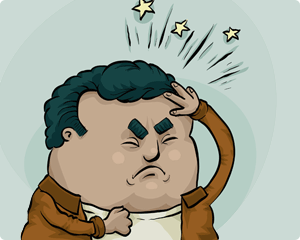The goal of keeping a migraine log or headache journal is to help keep track of symptoms and triggers so that you can eventually learn to prevent them or at least mitigate the effects.
If you get migraines, I feel for you. Yesterday I got another migraine, but I ran out of room in my handwritten log, so I decided it was time to create a spreadsheet for it.
In addition to creating the headache log (see the screenshot below), I decided to share some of the things I've learned about headache and migraine triggers. Some of this has come from things I've read ... but most of it is just my personal experience. So, obviously it's not meant to be medical advice.
This following list is not a comprehensive list, and I'm not going to include obvious stuff like the fact that alcohol can cause headaches. If you are needing to use a headache journal, it probably means you aren't sure WHY you are getting headaches or migraines. So, if some of the following things help just a few people, I'll consider writing this up a worthwhile use of my time.
Possible Headache or Migraine Triggers
#1 Water ... I used to get headaches almost every day, typically in the afternoons. I thought it was because I worked on a computer all day and was just getting tired. However, a colleague of mine suggested that it might be because I wasn't drinking enough water. I started drinking a lot of water in the mornings, and those routine headaches nearly disappeared completely. I have since learned that dehydration is also one of my migraine triggers.
#2 Activity ... Hitting your head against a wall can cause a headache. But, that's not what I'm talking about here. Different types of activity can cause different types of headaches. For example, working too long on a computer can make your eyes hurt, resulting in pain in specific locations of your head. I discovered pretty early on that bursts of intense physical activity, such as playing a game of flag football on the weekend or helping somebody load a moving truck, could trigger a migraine. After some experimentation, I discovered that drinking water wasn't enough (although it helped). But, if I drank Gatorade during the activity, I could usually prevent the migraine. I wouldn't have discovered this if I hadn't been keeping a log and trying different things.
#3 Lack of Sleep ... This is a common cause for headaches, but I've also found that a significant lack of sleep is one of my migraine triggers. I've seen "fatigue" listed many places as a common migraine trigger.
#4 Psychic Stress ... Okay, this is probably obvious for regular headaches, but it is worth noting in your log. I've found that stress alone seems to be able to trigger migraines, but by also noting times when I'm not stressed, it helps me to identify what other things might be triggers. This isn't to say that I get a migraine every time I get stressed - I'm still trying to figure out some consistent pattern.
#5 Muscle Tension ... For me, muscle tension in the neck appears to be both a trigger as well as a symptom of migraines. What I mean is that when I get a migraine, I end up getting pretty severe muscle tension in my neck. But, I've also noticed that I often have back pain and tension in my neck prior to a migraine. This of course is probably highly correlated with Psychic Stress, but I'm also starting to wonder if it could also be due to poor posture. Still working on this one.
#6 Food / Diet ... A lot of people I know that get migraines mention various foods as triggers. While that doesn't seem to be the case for me, it seems to be a commonly mentioned trigger. MSG is often mentioned as a trigger. Though MSG typically makes me extremely thirsty for a few hours after eating, I've never gotten a migraine due to MSG (that I know of).
#7 Other Triggers ... Menstruation is obviously not a factor for me, but it is a very common migraine trigger for women. I've never noticed noises, odors, or light to be triggers of my migraines, but I've heard and read reports of such things being triggers (and not just symptoms). I've also noticed that I tend to get migraines during or after an illness such as a cold or cough. That might be related to the other triggers I've listed, but it's almost a sure thing that if I get sick I'll end up with a migraine at some point.
This all might sound like I get a lot of migraines. In fact, I only average 2 per month, so I consider myself lucky.
Feel free to leave comments about what triggers you've discovered or how keeping a log has helped you. But, this blog isn't a place to ask medical questions. For that, I'd recommend checking out other forums or support groups on the internet.





Comments
Jon, this is my first visit to your website, and I must say that the variety and quality of your free information and templates is absolutely amazing!
I know that this is an old blog post, but I also get migraines (I started getting them in my late teen years and I am now in my 50s), and I thought I would mention two other migraine triggers, beyond the ones that you mentioned, that have affected me, and which affect many other people.
1. Fast barometric pressure changes.
Some people who have headaches due to pressure changes are sensitive to when the pressure goes quickly from low to high, but the majority of people who are sensitive to pressure changes mainly notice migraine headaches when the barometric pressure quickly goes from high to low. (I experience them with both types of pressure changes, but much more frequently when the pressure goes low.)
I can often tell when a storm will be coming in a couple of days’ time, and I can usually sense a hurricane that is off of the Atlantic (anywhere from Florida to Maine) even though I live 600 miles inland from the East Coast. That might sound hard to believe, but it is true, and it’s happened over and over.
This can be an inherited tendency, and my elderly mother also gets headaches specifically related to weather changes — for the last 10 years, she has lived with me, and we almost always react in the same way to the weather, although I experience worse pain and longer-lasting symptoms than she does.
It is a common reason for migraines, and most medical doctors know about it and are not surprised by it, but you will find some doctors who pooh-pooh it as if it made no sense.
The reasons for it aren’t entirely clear, but they think it has something to do with the blood vessels and blood flow in the head and their reactions to the environmental barometric pressure.
When I was in my 20s, I got migraines due to several different triggers (MSG and other food additives; the tannins in most, but not all, grape varieties of red wine; lack of sleep; seeing flashing lights; smelling certain odors; menstrual/hormonal ups and downs; barometric weather changes), but over that decade, I learned to avoid the triggers that were possible to avoid.
By my 30s, the unavoidable triggers that still caused me occasional migraines were: menstrual/hormonal ups and downs; barometric weather changes; flashing lights and strong odors in public that I could not easily get away from (for example, being seated on a full airplane near someone who was wearing strong perfume); and encountering hidden food additives in food that I could not examine or control, such as when eating at other peoples’ houses, or in restaurants that sneaked additives into food that in other circumstances I generally am okay with (such as salad leaves and other ingredients that are rinsed in a preservative solution to keep them fresher longer in the restaurant’s refrigerator).
Now that I’m in my 50s, I don’t have menstrual hormonal swings anymore, and the Covid lockdown and continuing Covid/flu concerns (especially because I need to protect the elderly relatives who live with me, including one long-term-ill family member who doesn’t have a working immune system) have reduced the frequency of my eating at restaurants or other people’s houses and have reduced the amount of travel I do (where I was occasionally in situations where I could not get away from noxious odors or from distressing light patterns), so it has become even more clear to me how almost all of the migraines I have had in the last 4 years have been solely due to easily-verified barometric weather changes, which I can’t control at all.
Note: Although I say that one can’t control barometric weather changes in the place one is currently at, one can attempt to choose a place to live where the barometric weather changes do not generally have the pattern that cause one’s headaches. For example, I used to live on the Atlantic coast of Massachusetts, where the frequent “nor’easter” stationary circling weather patterns caused me headaches, and I used to live abroad in several countries where my headaches were much reduced because they didn’t have the same kind of weather patterns and barometric pressure shifts as we do in the eastern half of the US. Now that our North American jet stream is wobbling more than it ever used to, and is tending to push down from Canada more frequently into the middle of the US, especially at times during the winter, I am suffering longer migraines (several days long) while that particular weather stream/system is “overhead” of my location in the northern part of the middle-Midwest. I can always feel when that is about to arrive. One thing I have learned from understanding this aspect of this migraine trigger for me that is that I don’t want to move to a more northerly place in continental North America than I am living at the moment, especially to Canada, where that atmospheric system more regularly undulates.
2. Brain tumors.
This seems like it’s a migraine trigger that only an unlucky few people might have to consider, but I had a couple of years when I experienced some really bad, several-days-long migraines, and then due to some unusual visual disturbances, I finally found a doctor who would take my complaints seriously and who agreed to order an MRI scan (which did confirm that I had a brain tumor that needed to be operated on).
The brain surgery didn’t change the frequency of my general migraines of the type that I’ve had for the last 35 years, but I have not had many of those really bad, several-days-long migraines in the years since the surgery.
Another tip — the brain tumor also caused me to have ringing in the ears for a few years — because, apparently, of how it changes the pressure in the head; the level of the tinnitus noise reduced after the surgery, but it didn’t fully go away.